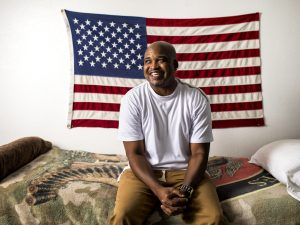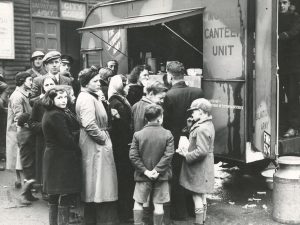Corps builds connection between ARC beneficiaries and congregation
By Chadwick Phillips –

In an attempt to facilitate the healing process for people in recovery, and bridge the gap between the Adult Rehabilitation Center (ARC) and the corps, the Pasadena Tabernacle Corps recently rented a property that serves as a transitional living house for ARC alumni.
“The Pasadena Tabernacle transitional living house is a step-down facility from the intensive ARC six-month program that the residents were in,” said Pat Riley, director of social services, who helps maintain the house and look over the residents. “Our goal is to successfully reintegrate the client into society, keep them in a safe environment, develop and further their relationship with Jesus Christ, and develop relationships with outside 12-step meetings to continue their personal recovery.”
Opened to residents in December 2013, the Pasadena Tabernacle transitional living house is one of the first transitional homes that is operated by a corps in working with an ARC.
ARC alumni who live in the house can walk to the corps for regular worship and other events. Although they are required to attend certain events, many residents voluntarily interact with the corps by participating in weekly Bible study groups, Christian 12-step meetings, and social events.
“It’s not that I have to go, I want to go,” said Scott Price, an ARC graduate and resident of the Pasadena transitional living home. “I am a five-minute walk away, and to me, it is critical living close to the Tabernacle because my life focuses so much around it.”
Price graduated from the ARC in December 2013 and immediately moved into the house.
“I lost everything due to my addiction and made one bad decision and ended up in prison for six years. I got out of prison, lost with no home and on top of that, my alcoholism raised its hateful head after a six year remission. I was struggling,” Price said. “An angel rescued me and took me to The Salvation Army ARC. I owe The Salvation Army my life and intend on spending the rest of my life paying them back.”
Living in the house is a not only a necessity for Price, but part of his recovery. He jokes about doing most of the cooking in the house, but states how proud he is of how sober the residents remain.
The house is currently home to four residents and a resident manager. Applications are currently under consideration for one more resident. Under the city ordinance, up to six unrelated residents may reside under one roof.
“For this facility, that is the perfect amount,” Riley said. “I think it is a nice, comfortable place and the residents here have made an atmosphere where it actually is a home, not just a transitional living house.”
Residents pay a security deposit, and monthly rent plus a fee to cover the cable television, telephone, and cleaning supplies. It is low-cost living in a high-income area.
Members of the corps donated a number of items for the house including towels, bedding, utensils, and the television.
“The congregation and the residents work and play together well,” Riley said. “Each individual in recovery has to have a sponsor. But one of the other things we are looking at doing is getting a spiritual mentor from the corps for them as well.”
Major Bill Nottle, officer care and development secretary, works as a liaison between the ARC and corps by merging the programming aspects and connecting with ARC graduates in the area, encouraging them to make the Pasadena Tabernacle their church home.
“I think it helps graduates get into a new lifestyle rather than getting into their old lifestyle, which creates a lot of their problems,” Nottle said. “The longer we have them, the greater success can take place. There is a three-prong thing. One is integration into the corps. The second thing they need is safe housing. And the third thing, which we are trying to work on, is jobs.”
Ongoing employment is one of the keys to maintaining sobriety for most addicts. It provides a sense of purpose, makes one accountable, provides routine, and also boosts self-esteem. Steady employment is also essential to the success of Salvation Army sober living facilities, as residents must pay rent.
“It has always bothered me that there hasn’t been a post grad program,” Price said. “Having a job is a critical part of recovery.”
The ARC allows beneficiaries the option to leave the facility one day a week in order to look for employment. Many, however, spend a lot of time searching online.
“I personally visit the ARC several times a week for meetings I run, including resume writing,” Price said. “I currently write the resumes for everyone graduating, if they ask. No fee, just part of my program. I have an education and a trade, so for me, I had a job before I graduated. Most jobs for ARC grads start at minimum wage to $11 an hour. That is enough money to live in sober living homes, but not much more.”
Unfortunately, finding and maintaining regular employment has proven challenging for a great number of ARC alumni. Many feel disadvantaged due to their past.
“A lot of people who are in the ARC have some sort of history with the correctional system, and it is very hard to get employed that way,” Riley said. “Jobs by far is the biggest drawback for our clients. We have had clients who have had jobs and lost jobs, but stayed around; they didn’t leave and they didn’t go out and use…from my perspective, that is success.”

Price says that he is currently working with the ARC program director to teach both computer and resume writing classes. “This would give a novice computer user more knowledge on how to operate and use basic programs such as Word and Excel,” he said.
The Pasadena Tabernacle Corps is now looking into opening a second transitional living house, but the directors are taking their time to see how the current house runs.
Jody Davis, the corps’ business administrator and a retired police officer, saw in his previous profession that that recidivism rate for those who have been incarcerated was about 80 percent due to their returning to the same environment.
“We saw the same thing happening within the people graduating from the ARC,” Davis said. “They would have no place to go but right back into that environment that brought them there. So, the transitional living house was that opportunity to help continue to break that cycle so that they had someplace to go where they were safe and they could continue their recovery.”
Riley’s ultimate goal is for the transitional living home to be monetarily supported enough that when a resident leaves, he or she will be given 50 percent of paid rent back to go toward a down payment on an apartment and other costs of independent living.
“We want to see these people succeed,” Riley said. “We don’t want to see these people come back to the ARC, except as alumni.”













I congratulate Pasadena Tabernacle Corps for this noble work.
I congratulate Pasadena Tabernacle Corps for this noble work.
How awesome! Congrats on such a wonderful achievement! Thanks for sharing!
How awesome! Congrats on such a wonderful achievement! Thanks for sharing!